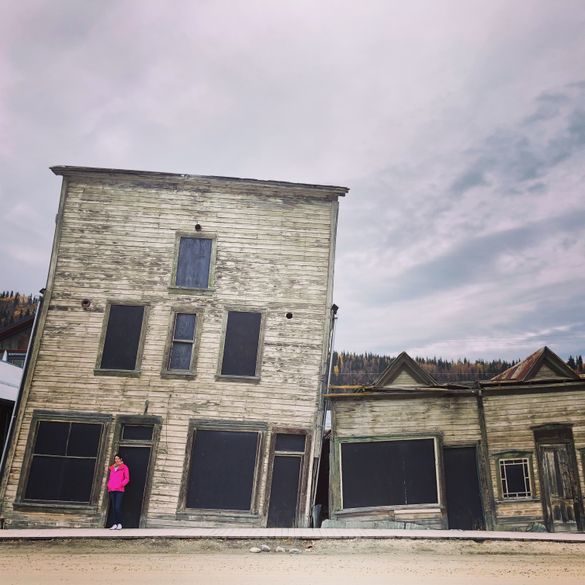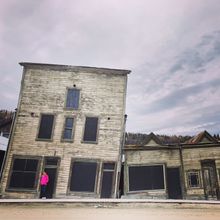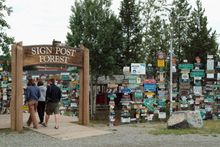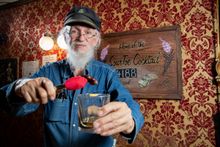 08 Oct 2024
08 Oct 2024
Visitors to Canada's north-western Yukon Territory can expect the unexpected. With its rich gold rush history, extreme environment and innovative locals, the territory is awash with fascinating relics, traditions and architecture you simply won't find anywhere else.
Watch for the signs… and leave one of your own
As you cruise through Watson Lake, 436 kilometres east of Yukon's capital city of Whitehorse, keep your eyes peeled for a road-side collection of more than 90,000 signs from around the world. This unique time capsule dates back to 1942 when US Soldier, Carl K. Lindley erected a sign marking the distance to his hometown, Illinois. The trend caught on, with locals and visitors from across the globe continuing to add their own signposts. You can BYO or make one at the Watson Lake Visitor Information Centre to contribute to this peculiar, colourful collection.
Pucker up at Dawson City's kissing buildings
In a town brimming with history, it's little wonder even the buildings In Dawson City seem to be frozen in time – literally. Check out the "Kissing Buildings" on 3rd Avenue that lean into each other as though locked in a friendly embrace. Built in 1901, these Gold Rush-era structures were placed directly on the ground, a common practice at the time. But as the permafrost beneath them thawed and shifted, the buildings slowly began to tilt, eventually resting against each other. Now affectionately called the "Kissing Buildings," they've become a beloved tourist attraction. Snap a photo of this unique architectural kiss as a fun and fitting way to capture the magic of your visit! Before you leave this quirky township, stop in at the the Dänojà Zho Cultural Centre and pick up a Dawson treasure to commemorate your trip. Next door, check out the S.S. Keno National Historic Site of Canada, a steam powered sternwheeler river vessel that connected Northerners to the outside world from 1922 until modern roads extended into the interior.
Pay your respects at the paddlewheeler graveyard
Tucked away in a spruce forest on the banks of the Yukon River near Dawson City lies the skeletal remains of several paddlewheel boats, a nod to the region's nautical history, when the primary mode of transport was by water. This unique 'museum' attracts travellers and history buffs, keen to explore these massive wrecks with their fascinating structure and struts. Since the Klondike gold rush, countless paddlewheelers navigated the rugged wilderness to deliver essential goods to towns like Dawson City, Whitehorse, and Fairbanks. However, with the introduction of airplanes and highways, the reliance on riverboats gradually declined. The S.S. Keno was the last stern wheeler to ply the Yukon River in 1960. Visitors can also stop by the Tourism Yukon Visitor Information Centre from May – September.
How to find it: Board the George Black Ferry and travel across the Yukon River. Make your way to the Yukon River Campground and continue to the end of the campground, stopping at a yellow gate. Follow the trail to the river's shore and walk approx. 200 metres downstream to the paddlewheeler graveyard.
Bottoms up! Kiss the toe in Dawson City
This is one club you can't join anywhere else on Earth. The Sourtoe Cocktail is a world-famous (horrifying) tradition dating back to 1973. The friendly bar staff at the Downtown Hotel in Dawson City will serve you a shot of whisky containing a mummified human toe. Over the past 50 years, more than 100,000 people have joined the club simply by following this rule: YOU CAN DRINK IT FAST, YOU CAN DRINK IT SLOW – BUT THE LIPS HAVE GOTTA TOUCH THE TOE. Be brave and earn yourself the official certificate, not to mention the respect of Dawson City locals and the ultimate bragging rights back home.
Log 'skyscrapers' in Whitehorse
The Yukon is home to some seriously quirky architectural structures, a testament to the territory's rich history and eclectic residents. Witness the log skyscrapers on Lambert Street, Whitehorse, the handywork of Martin Berrigan. During the post-war boom, Whitehorse was growing fast, and housing was in high demand as workers flocked to the city for major construction projects like the Alaska Highway and the Canol Pipeline. Enter Mr. Berrigan, an ambitious innovator who built Whitehorse's first “log skyscrapers”—three-story buildings made from massive logs, blending the rugged frontier with urban practicality. These unique structures helped ease the housing crunch and have since become modern apartment buildings. Berrigan's legacy lives on, with the city designating the log skyscrapers a Municipal Historic Site in 2000.
Beer bottle insulation in Keno
One of the oldest buildings from the early days of Keno boasts a unique form of insulation – beer bottles! Geordie Dobson, a longtime Keno City resident and former merchant marine, moved one of the town's oldest surviving buildings from the nearby mining camp of Calumet. After buying the Keno City Hotel in 1952, Dobson got creative with his home, insulating it with 32,000 empty beer bottles over four years. 32,000 beer bottles later, the house is very warm, helped by 60 centimetres two feet of mortar. Though the property is a private residence, it's a local gem in Keno City and a one-of-kind backdrop for an Insta-worthy photo! Keno is located 450 kilometres north of Whitehorse.
How to get there
Air Canada offers daily direct flights to Vancouver from Sydney and Brisbane. Direct flights from Sydney to Vancouver are also available on Qantas. Internal flights to Whitehorse and Dawson City are available on Air North and Air Canada.
Visit travelyukon.com




